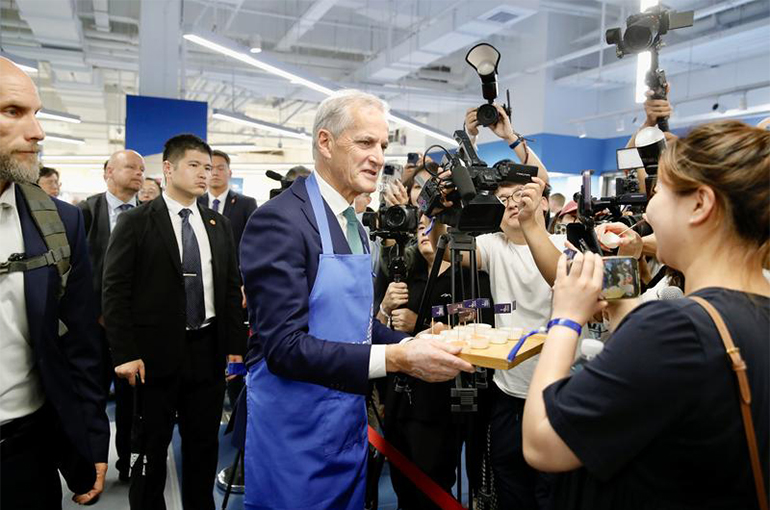 Norway’s PM Turns Fishmonger in Shanghai, Seeks Deeper Ties With China in EVs, Shipbuilding
Norway’s PM Turns Fishmonger in Shanghai, Seeks Deeper Ties With China in EVs, Shipbuilding(Yicai) Sept. 13 -- Norwegian Prime Minister Jonas Gahr Støre stepped into the shoes of a fishmonger in Shanghai to promote his country's seafood. He also expressed interest in deepening cooperation with China in the fields of electric vehicles and shipbuilding.
Støre traveled by high-speed train from Beijing to Shanghai on Sept. 10 and went straight to a local supermarket where he donned a blue apron, held a wooden platter, and invited shoppers to try Norwegian seafood sashimi. "How does it taste?,” he asked them.
Seafood is a major industry for Norway, second only to oil and gas. Norwegian seafood, especially salmon, has become a global high-quality food brand, and China is an increasingly important market. China is Norway's most important seafood market outside of the European Union, and it is also its largest trading partner in Asia and third largest after the EU and the United States.
The European nation aims to increase its seafood exports to China, Støre pointed out. Exports are growing and shipment times will hopefully come down as collaboration is stepped up, Støre said, allowing Chinese consumers to enjoy fresher salmon and other Norwegian seafood products.
Norwegian salmon sales in China will likely jump 8 percent to 10 percent this year, Sigmund Bjørgo, director of the Norwegian Seafood Council in China, told Yicai. Seafood exports to the Asian country have doubled over the past six years, while salmon sales have surged fivefold, he added.
China is truly a prosperous and promising market, Bjørgo pointed out. While acknowledging some downward pressure on Chinese consumer spending, he remains optimistic about the future, noting that consumers are becoming more cautious but are still willing to indulge in quality food and are increasingly health-conscious.
China's per-capita salmon consumption remains low at about 80 grams, compared to South Korea's 730 grams and Singapore's 1.83 kilograms.
During his visit to China from Sept. 9 to 11, Støre also expressed Norway's desire to expand overall cooperation, particularly in green development, climate change response, maritime shipping, agriculture and fisheries, new energy vehicles, and artificial intelligence, Xinhua News Agency reported.
On Sept. 11, Støre attended a ceremony in Nantong in China's eastern Jiangsu province to name a car carrier built by a Chinese shipyard for a Norwegian shipping company. China's ship yards have over half the global market, while Norwegian firms can provide technical support, Støre said, adding that this complementary relationship can bring mutual benefits.
Norway is not a member of the EU and does not share trade policies with the bloc, Støre said regarding the EU plan to impose additional temporary tariffs on EVs imported from China. Its auto industry is also lacking, so it will not impose tariffs on such vehicles, he noted.
Norway serves as an entry point for many Chinese EV makers into Europe. Electric cars made up 82 percent of new auto sales in the country last year, with Chinese brands, including SAIC Motor's MG, Polestar Automotive Holding, and BYD, ranking among the top 20, according to the Norwegian Road Federation.
Editor: Martin Kadiev